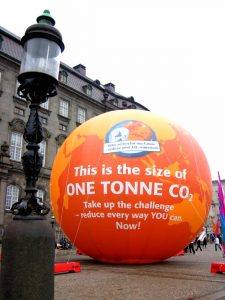 GUEST BLOG
GUEST BLOG
Daniel Cope: Ambassador for the Environment
One of my biggest environmental-pet-peeves is the expression (or one similar to it) of ‘I can’t make a difference to reduce climate change, for I am just a lowly individual’. Of course, the sense of being ‘powerless’ is understandable, as is the concern of an inevitable breakdown of life as we know it. This feeling doesn’t absolve us of our obligation to continue in ignorance, however, even if it is easier, and helps us to sleep better at night. In the run-up to COP26, what actions can we take, personally?
What is the footprint of an individual?
Before anything, we have to get our own house (literally) in order. In the UK, the average carbon footprint of an individual is 5.45 tonnes of CO2e (Carbon Dioxide equivalent). This is made up of your household energy use, diet, travel, and any other activities you partake in. It also includes elements that you don’t have direct control over, such as street lighting and public buildings. If you’re struggling to conceptualise 5.45t CO2e, take a look at the balloon below, representing just 1t CO2e!

Just how big is one tonne of CO2e?
If you’re interested in your own footprint, I would encourage you to complete an online calculator. I’ve long been a fan of Carbon Footprint‘s calculator; it’s free to use and updated regularly (important in a fast-changing environment). If you’re competitive, mine is 3.35t CO2e, let me know if you beat it! This is a great first step in understanding your direct impacts, and from here, how you could improve upon it in the future. You can also carbon offset your tonnage, to balance the impact, whilst you tackle it through behavioural changes in the longer term.
Reducing your carbon footprint
Once you have your carbon footprint, you can take more effective actions to combat it (don’t underestimate how empowering this is). Personally, I often separate these measures into two groups, those that will impact my perceived quality of life and those that will have minimal if any impact. For example, switching from a petrol to electric vehicle, whilst reducing carbon, will impact my quality of life (financially, at least in the short term), whilst driving my existing petrol car more fuel-efficiently won’t have any quality of life impacts (I’ll still get from A to B), and could save up to 30% of existing emissions! It’s easier to tackle the latter if the former just isn’t possible.
Remember, it doesn’t have to be an all-or-nothing position, which can have the opposite effect of giving up before we have begun. If you don’t fancy going 100% plant-based, why not try out meat-free Mondays, as 1 day a week will still reduce animal-derived CO2e impacts by more than 14%.
With all that said, It is important that we take personal responsibility for the emissions we create. Waste is a good example of this; it’s assumed (in most cases) that, as a resident, it’s our responsibility to sort our household rubbish and place it out for collection. Whilst that may be where our legal responsibility ends, what about the materials not recycled at kerbside? Everything from wood to crisp packets, batteries to shaving blades now have a place to be recycled. Yes, it’s more work, and yes, space to store these at home can be an issue, but do either reasons hold weight against the backdrop of a failing planet? In this respect, the choice is surely clear? TerraCycle have led the charge in collecting these streams (it’s worth checking out their website). Supermarkets have also filled in this gap, with a large increase in recycling banks on car parks and store entrances, diverting waste which to the most part generally landfilled or burnt.
Inspiring others beyond your household…from your chair
Beyond our own footprint, we can look further afield at the footprints around us, and importantly, how we can influence them. With social media, the ripple effect of an individual is more potent than ever. How often do we see a large multinational company change its approach to an activity or issue, resulting from a debate sparked by one customer’s tweet? To be clear, I’m not a fan of business-assassination through social media, but gentle pressure from the public reminds businesses what’s important to their potential customers.
Similarly, creating and sharing any content that promotes sustainable living can inspire those around you. Partly brought on by lockdown, the resurgence of make-do-and-mend, along with upcycling and DIY-fashion has seen a huge boom. The innovative content, coupled with the power of social media, has resulted in thousands of tonnes of CO2e saved.
Beyond social media, individuals also have the power to reach out to businesses and government directly through a quick search for an email. Even online petitions, whose overall effectiveness may be complex to measure, there’s no doubt that several high-profile environmental petitions have led to direct action and U-turns on ill-thought out decisions and policies.
Whilst COP26 is less than 2 months away, it will be crucial we continue our climate-actions into 2022 and beyond, Together for Our Planet.


